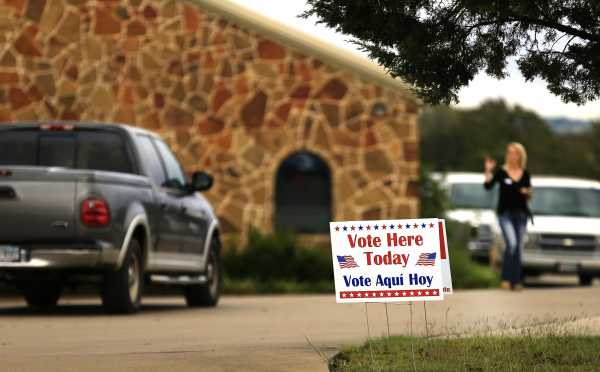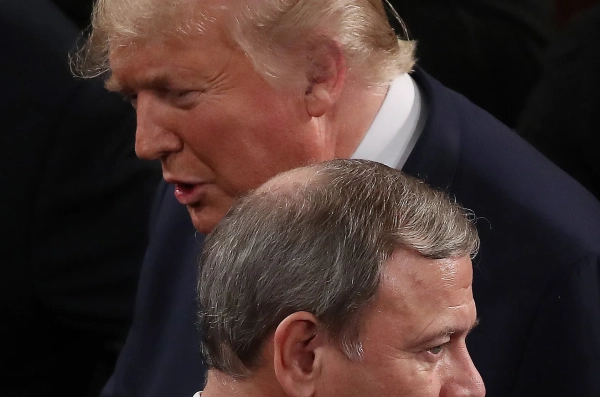
Democrats want to chip away at Republicans’ stronghold in Texas. Tuesday’s primaries are the first test of whether the party has a shot at turning the Lone Star State a little bit bluer.
Texas’s Democratic and Republican primaries would normally be a blip on the electoral calendar. But in 2018, they’re an early bellwether for this year’s midterms. Both parties will be judging turnout to get an early, if imperfect, measure of voter enthusiasm. Democrats are banking on anti-Trump backlash and the state’s changing demographics to swing things in their favor; Republicans hope fear of that happening will fire up the base.
Early voting ended on Friday, and those first vote tallies offered promising signs for Democratic enthusiasm.
Election day voting begins again on Tuesday, and polls close at 7 pm local time (8 pm Eastern time).
The primaries will narrow down crowded Democratic and Republican fields to determine which two candidates will go to a runoff on May 22.
There are also eight open congressional seats in Texas, mostly courtesy of a slew of representatives retiring. Six of those seats are in currently Republican-held districts. That means some jam-packed fields for the GOP, and the winners in these races — or runoffs in May — will likely be favored in November.
Republican Sen. Ted Cruz is also up for reelection in 2018. He’s expected to sail through his primary, as is the likely Democratic contender, Rep. Beto O’Rourke, who represents the El Paso area.
There’s also a governor’s race. Democrats will essentially be selecting the candidate to lose to the popular GOP incumbent Greg Abbott in November. But losing is one thing, getting trounced is another — and if Democrats can select a strong candidate and come within striking distance, it might be an omen of victories to come.
The vote count will be updated here.
Congressional primaries: Democrats and Republicans face crowded races
The Democratic push and the fate of open House seats are the two big storylines in the Texas congressional primaries.
As Ella Nilsen broke down in her in-depth explainer, Democrats are energized in Texas for two reasons: Trump’s low favorability and the state’s changing demographics, with Latinos making up a bigger share of the population.
Democrats are targeting three key districts: the Seventh, 23rd, and 32nd. What do they have in common? They’re red districts that voted for Hillary Clinton over Trump in 2016.
Seven Democratic candidates are competing for the Democratic ticket in the Seventh District in the suburbs of Houston, represented by incumbent John Culberson. The three leading candidates include Laura Moser, a progressive activist; Lizzie Pannill Fletcher, a Houston attorney; and Alex Triantaphyllis, a Houston nonprofit executive.
This primary has revealed some of the fissures within the Democratic Party, after the Democratic Congressional Campaign Committee released an opposition memo against Moser based on a story she published in 2014 where she claimed she would “sooner have my teeth pulled out without anesthesia” than move back to Texas. The DCCC fears that Moser — who’s backed by a progressive group that supported Bernie Sanders — will struggle in a general election versus Culberson. The DCCC’s desperation to flip the seat prompted its involvement, though it has otherwise kept a low profile in the primaries.
The 23rd District, currently represented by Rep. Will Hurd, is another swing seat Democrats want to capture. The district, which includes San Antonio, sits along the Mexican border — making immigration a key issue. There are five Democrats competing for the seat, but Jay Hulings, a former federal prosecutor, and Gina Ortiz Jones, a former US Air Force officer, have emerged as the two leading candidates.
The Democrats also covet the 32nd District, in the Dallas suburbs. Seven Democratic candidates are facing off in the primary to take on the powerful incumbent, Pete Sessions. The top Democratic candidates include Colin Allred, a civil rights attorney and former NFL player; Ed Meier, a former Obama official and Clinton campaign staffer; and Lillian Salerno, another former Obama administration official.
Unless a candidate wins the primary with more than 50 percent of the vote, the top two candidates in each race will enter into a runoff on May 22. Given the glut of candidates, that seems likely in these contests.
But this is Texas, after all. Republicans have the advantage. Seven representatives are retiring this year, all but one in GOP-held districts. (The eighth open seat, which also favors the Democrats, belongs to O’Rourke, who’s running for Senate.) Seats are open in the Second, Third, Fifth, Sixth, 21st, 27th, and 29th, the last one being the only reliable blue seat.
These open seats have invited a slew of GOP candidates to compete — meaning these primary races are also likely to go to a runoff on May 22. The Second District, currently held by Rep. Ted Poe, has a field of nine GOP candidates. Kathaleen Wall, a Republican activist and fundraiser, is currently leading (and out-fundraising) the crowded contest. Eight Republicans are competing in the Fifth District in the Dallas area, including former Ted Cruz staffer Jason Wright and Republican fundraiser Bunni Pounds, who has the backing of the retiring Rep. Jeb Hensarling.
Texas’s 21st Congressional District— which covers an area near San Antonio and Austin — might hold the record: 18 GOP candidates are trying to win Rep. Lamar Smith’s long-held seat.
Texas’s Sixth District will also have a new Congress member for the first time in three decades, after Rep. Joe Barton announced his retirement amid a sex scandal. A total of 11 Republicans candidates are vying for the seat in the Dallas-Fort Worth area, which makes this race almost guaranteed to go to a runoff. Democrats are also eyeing this one as an outside shot, with five candidates competing in the primary.
Longtime Republican Rep. Sam Johnson is retiring from Texas’s Third District. The seat is reliably red, but — fun fact — there just happens to be a Democratic candidate named Sam Johnson who’s competing for the seat.
The guy who gets to (maybe) beat Ted Cruz
Rep. Beto O’ Rourke, a popular Congress member from the El Paso area, is the frontrunner in the Democratic primary to take on Sen. Ted Cruz in the general election.
O’Rourke has out-fundraised Cruz and has gotten a lot of media attention as a legitimate Democratic challenger. Texas hasn’t had a Democratic senator in close to 25 years, and while O’Rourke is gaining a big following in progressive circles, he doesn’t quite have the name recognition of Cruz across Texas.
Either way, Cruz and O’Rourke will likely sail through their contests, setting up an attention-grabbing midterm contest.
Texas statewide races
Republican incumbents are likely to make it through their primaries easily on Tuesday, particularly for the high-profile races. Gov. Abbott had been polling with about a 95 percent lead over his Republican challenger Barbara Krueger.
Democratic candidates are likely battling for the honor of losing to Abbott in November, but a robust and crowded primary is still an encouraging sign for Democrats who have barely put up a challenge in past years. The field includes nine Democratic candidates; the frontrunners are Andrew White, the son of former Texas Gov. Mark White; and Lupe Valdez, a former Dallas County sheriff. Valdez led White 43 to 24 percent in a University of Texas/Texas Tribune poll published in mid-February.
And we’d be remiss if we didn’t mention perhaps the most Texas race of all: that of the Texas land commissioner. George P. Bush is running for reelection in a contentious primary focused on the Alamo.
Sourse: vox.com






